What is the Oslo Pass?
The Oslo Pass is a ticket that grants you entry to lots of museums and attractions around Oslo. It also provides free public transport and discount at selected restaurants and activities. You can buy the pass at tourist information points and visitor centres or you can download the app and buy the pass through there.
How much does the Oslo Pass cost?
The Oslo Pass has a few different prices, depending on the length of time you want it to last for. For adults the prices are:
| NOK | EUR | GBP | USD | |
| 24 hour pass | 445 | €40 | £35 | $47 |
| 48 hour pass | 655 | €58 | £51 | $69 |
| 72 hour pass | 820 | €73 | £64 | $86 |
Discounts are also available for children, seniors and students. To claim these discounts you must buy the pass in person, rather than on the app, as proof of ID will be required. Click here to see all the details on discounted prices.
Once you buy the pass on the app, the timer starts running down when you scan it at the first attraction or transport. We opted for the 24 hour pass and managed to squeeze a lot in – read on to see how we did it!
What is included on the Oslo Pass?
There are tonnes of museums included on the Oslo Pass. Below are the ones that we visited on our 24 hour pass that we would recommend. Don’t forget you also get free public transport including ferries so it makes it super easier to travel between museums.
1. Norsk Folkemuseum
The Folk Museum was possibly my favourite activity in Oslo. It is one of the oldest open air living museums in the world. If you’re from the UK, you might know Beamish Museum or the Black Country Living Museum – its similar to those. Also if you have been to Skansen in Stockholm, again similar style museum.

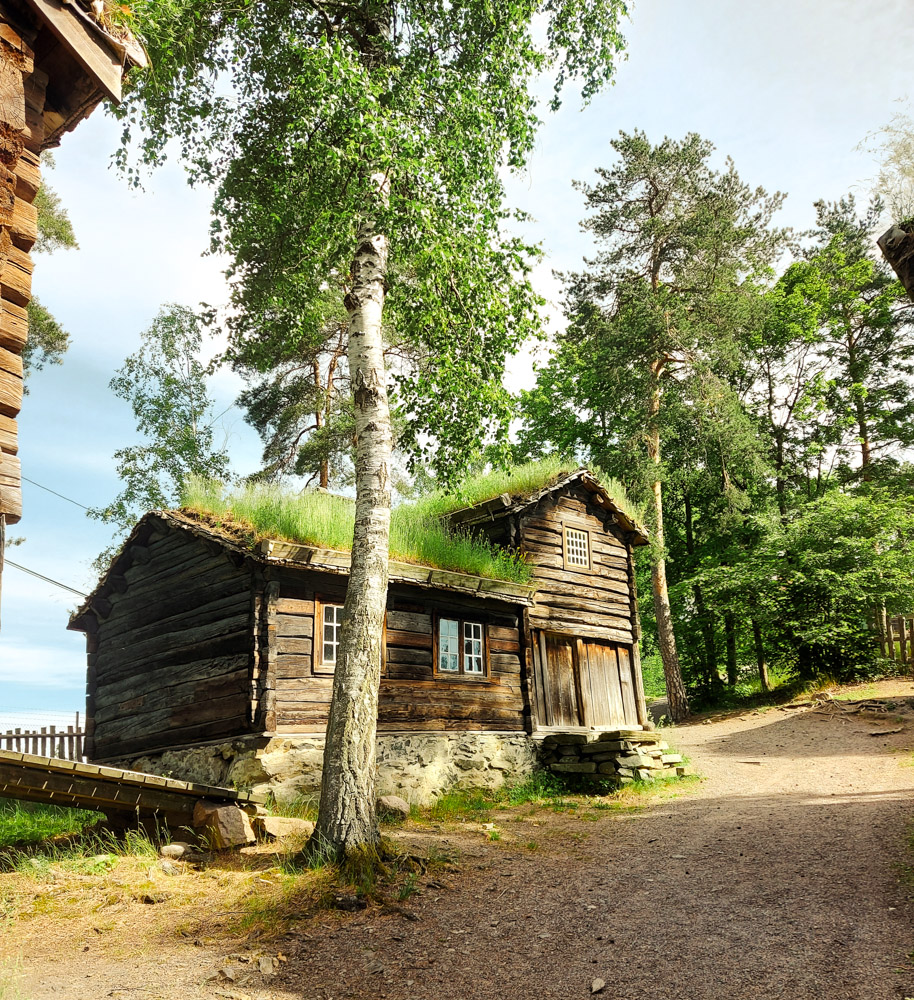
The Norsk Folkemuseum is set across a fairly large area and features lots of old structures rebuilt from around Norway. You’ll find plenty of traditional wooden cabins with mossy roofs and old farm houses. Perhaps the most photographed part of the museum is the black Gol Stave Church, an impressive structure from the 1200s.
Don’t miss the Folkemuseum’s 1950s town. There you’ll find an entire apartment building furnished with mid century furniture and decor reflecting different families. There is also a bar, mini petrol station and a shop.
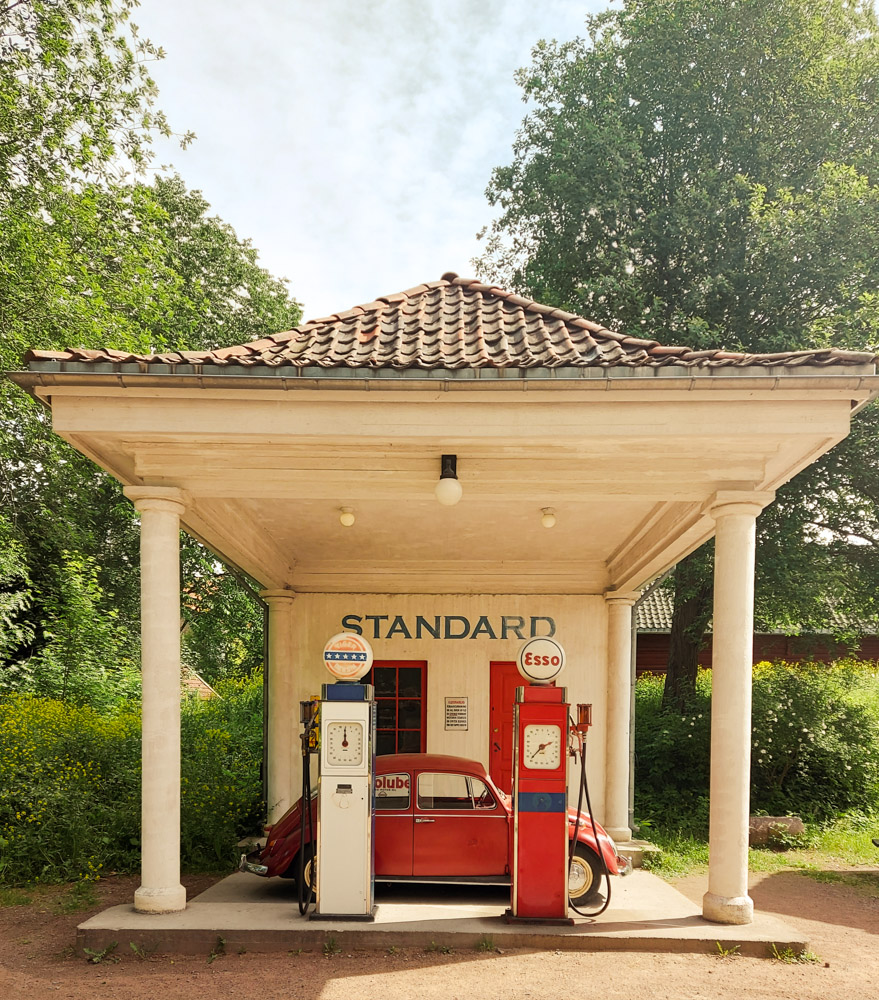
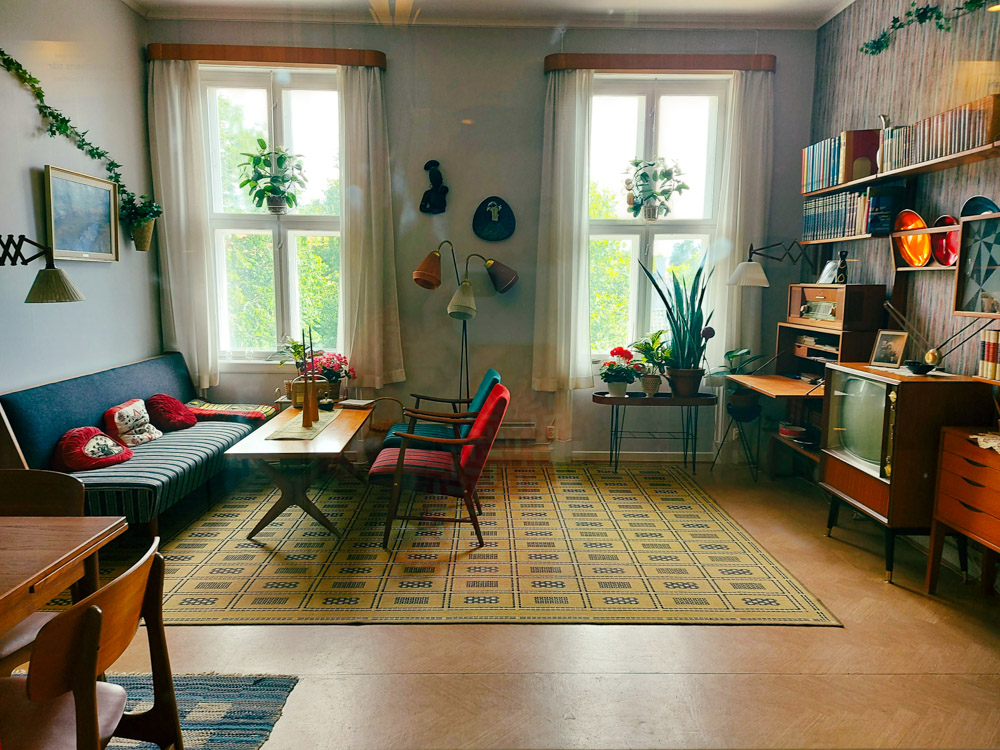
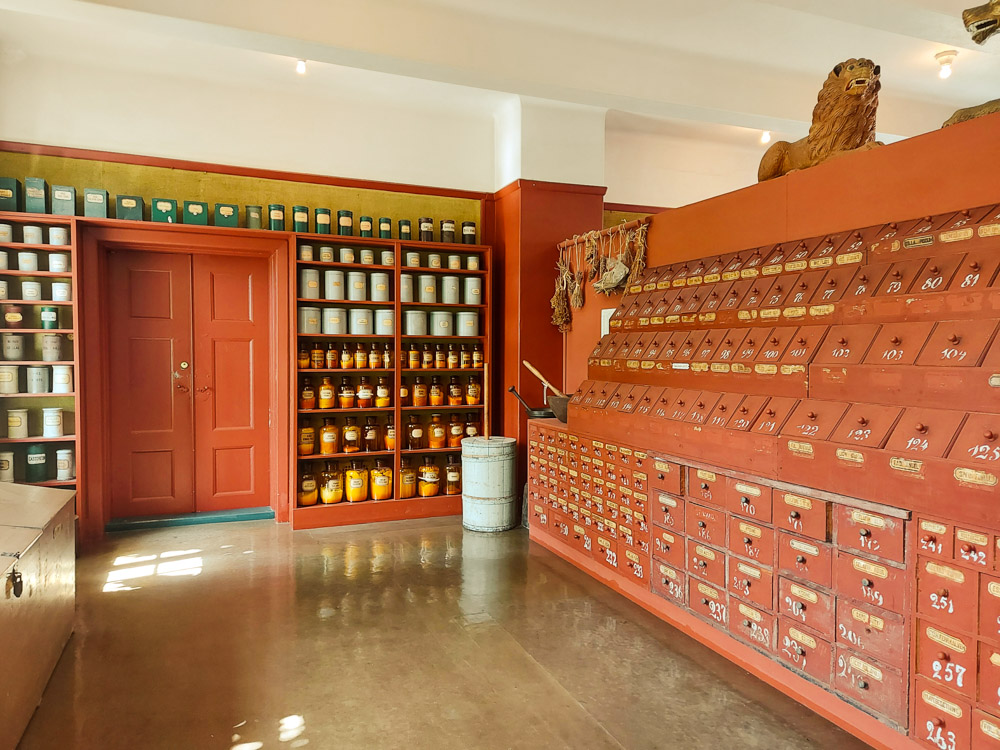
Tucked away behind the 1950’s town is an old prison and an entire pharmacy museum which is easy to miss so look out for it! The old pharmacy shows old fashioned techniques for making medicines. It is staff by retired pharmacists who are all happy to share stories of how they used to make everything in lab on site at old pharmacies.
There is a lot to explore at Norsk Folkemuseum. You could easily spend half a day there or even a full day. There are also indoor museums and exhibits on site too, plus a cafe and gift shop. This would be a fantastic museum to visit with children.
Norsk Folkemuseum is open everyday from 10:00-17:00 and costs 180 NOK without the Oslo Pass
2. Kon-Tiki Museum
The Kon-Tiki Museum shares a super interesting story that I had never heard of before coming to Olso. It centres around a raft built in the 1940s using ancient techniques and materials. The Norwegian explorer, Thor Heyerdahl, had a theory that people who lived in the South Pacific Islands may have originated from South America, rather than Asia as originally thought. Few people believed him as they didn’t think it possible that people could have travelled so far by sea thousands of years ago. So Thor set out to prove it possible by taking the journey himself.
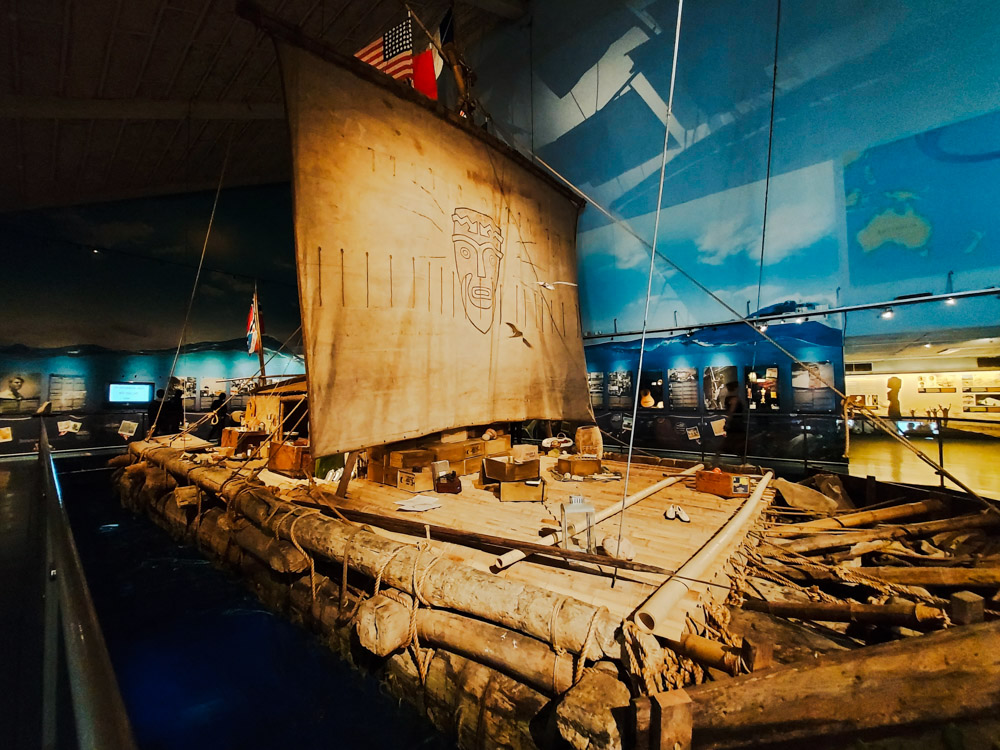
I’ll not give too many spoilers but the museum follows the story of Thor and his crew and their adventures. There is also a second boat from another expedition too. It’s a crazy story but Kon-Tiki is a really interesting museum to visit!
Kon-Tiki Museum is open everyday from 11:00-17:00 with longer opening hours in the summer. It costs 140 NOK without the Oslo Pass
3. Fram Museum
The Fram Museum is just opposite Kon-Tiki and also centres around a boat. Fram is all about polar exploration and the Norwegian teams that set out to reach the South Pole.
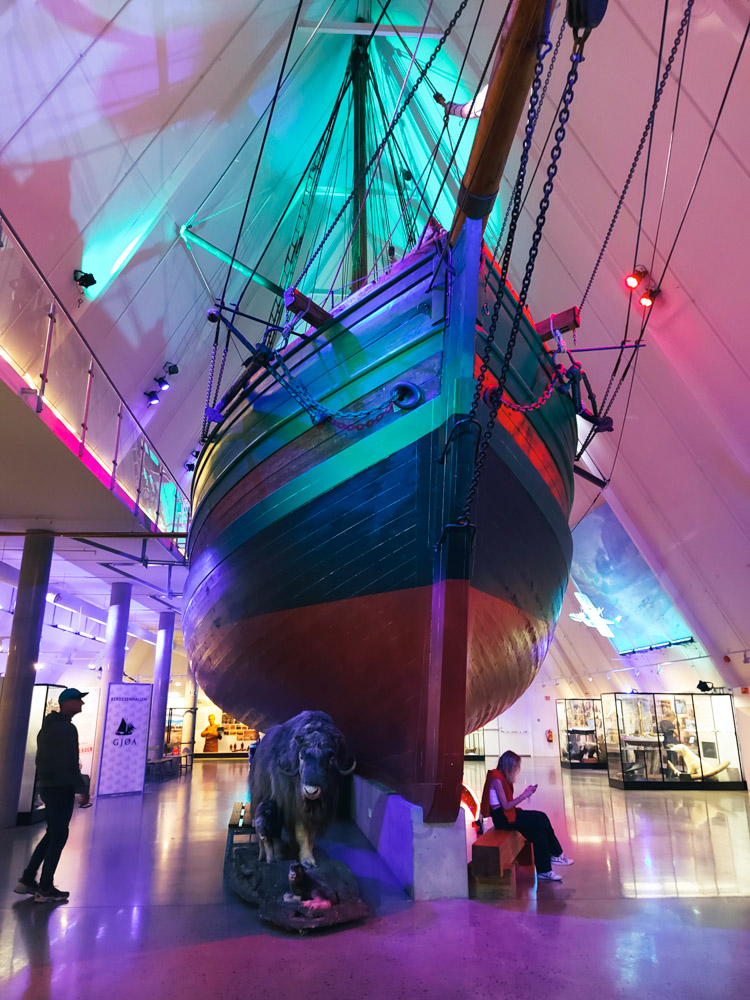
A lot of the exhibit is in the boat itself so you can enter the deck and see the cabins where the crew lived. Also don’t miss the polar ice experience! This is a freezing chamber that allows you to experience a few seconds of what a polar mission might feel like!
Fram Museum is open everyday from 10:00-17:00 and costs 140 NOK without the Oslo Pass.
4. Nobel Peace Center
The Nobel Peace Center is museum about previous Peace Prize winners. The exhibit about the 2021 winners – Maria Ressa and Dmitry Muratov about their fight for a free press was fascinating. I imagine this exhibit will change once the next winners are announced. There is also a permanent exhibit about the history of the Nobel Peace Price and interactive displays to find out more about each of the previous recipients.
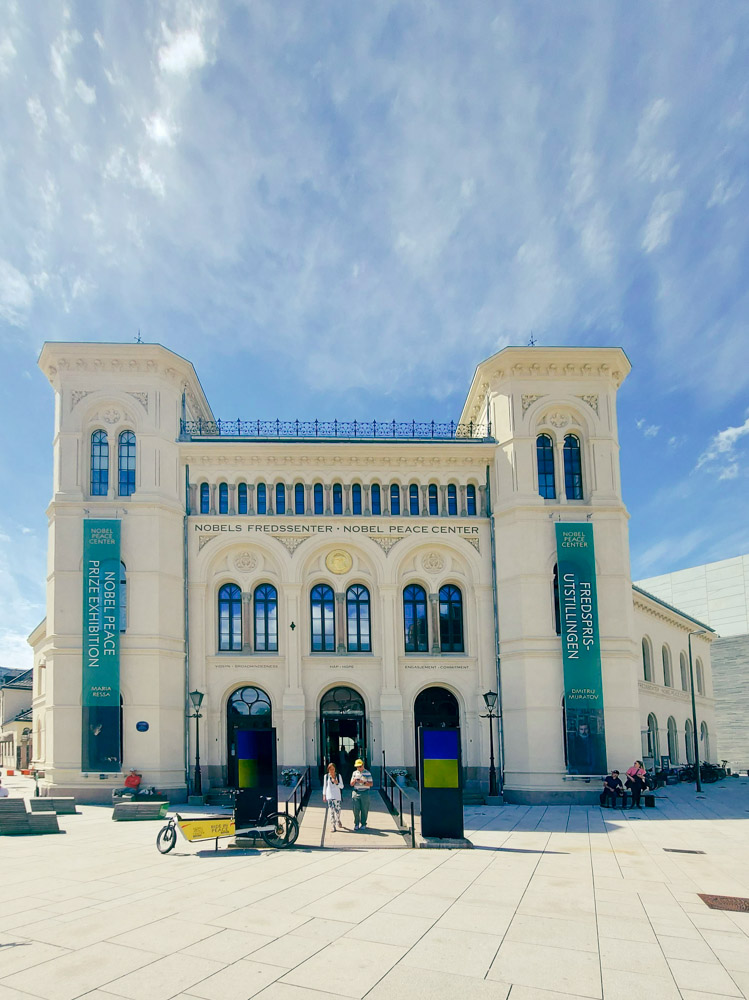
The Nobel Peace Center is open everyday from 11:00-17:00. It costs 140 NOK without the Oslo Pass
5. Akershus Fortress and Castle
Akershus Fortress is free to enter and wander around. It’s a fairly large area with lovely views over the harbour. The visitor centre is also free and has a display about the 1300’s Queen Margaret. However, to enter the castle part of the fortress where the royalty once lived, you need to pay or have an Oslo Pass.
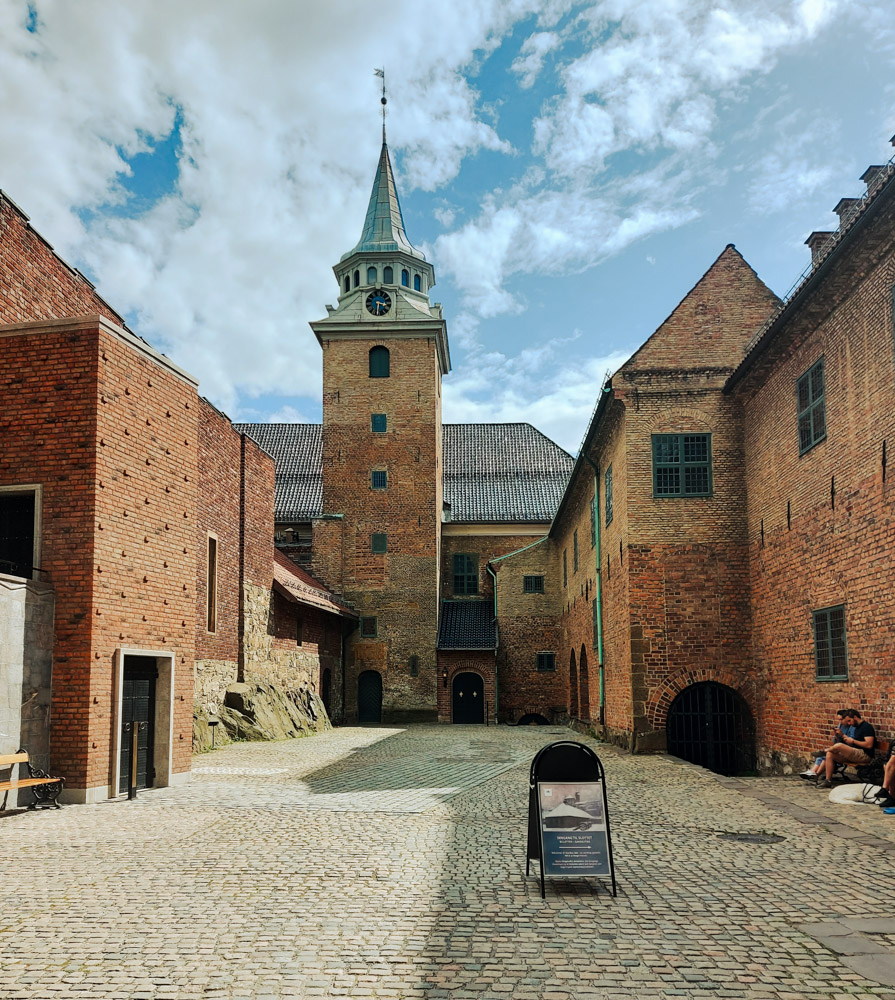
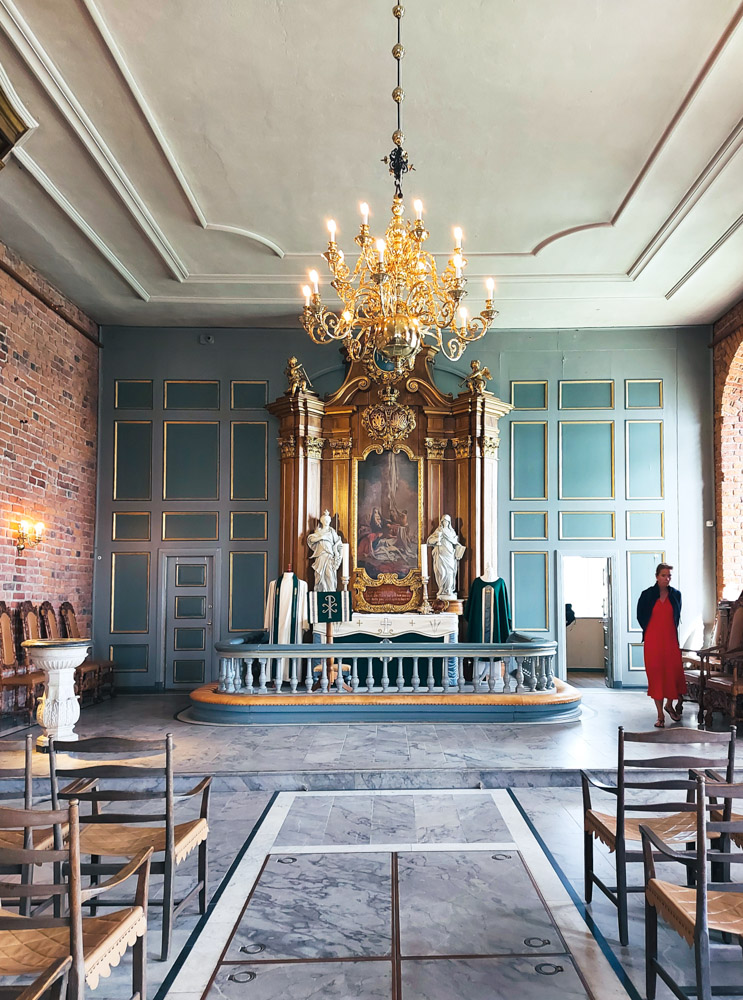
The castle is pretty much what you would expect from a medieval castle. Lots of antique furniture, ornate tapestries, a dungeon and of course a suit of armour!
Akershus Castle is open everyday from 10:00-16:00 (12:00-16:00 on Sundays). It costs 100 NOK to visit the Castle without the Oslo Pass. The fortress grounds are free and open until 9pm.
6. Munch Museum
The Munch Museum is dedicated to the Norwegian artist, Edvard Munch. His most famous work, The Scream, can be viewed in the museum along with many other masterpieces. You don’t need to be into art to enjoy this museum, it is far more than an art gallery! Each floor offers a very different kind of exhibit. These range from expected portrait galleries to interactive draw-on-the-wall displays to a musical collaboration with metal band Satyricon.
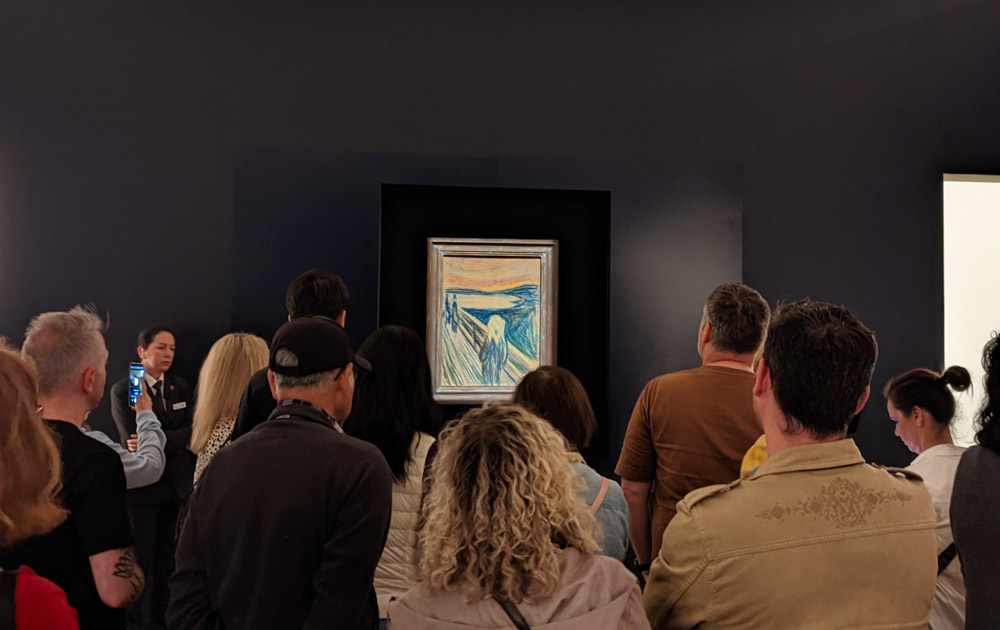
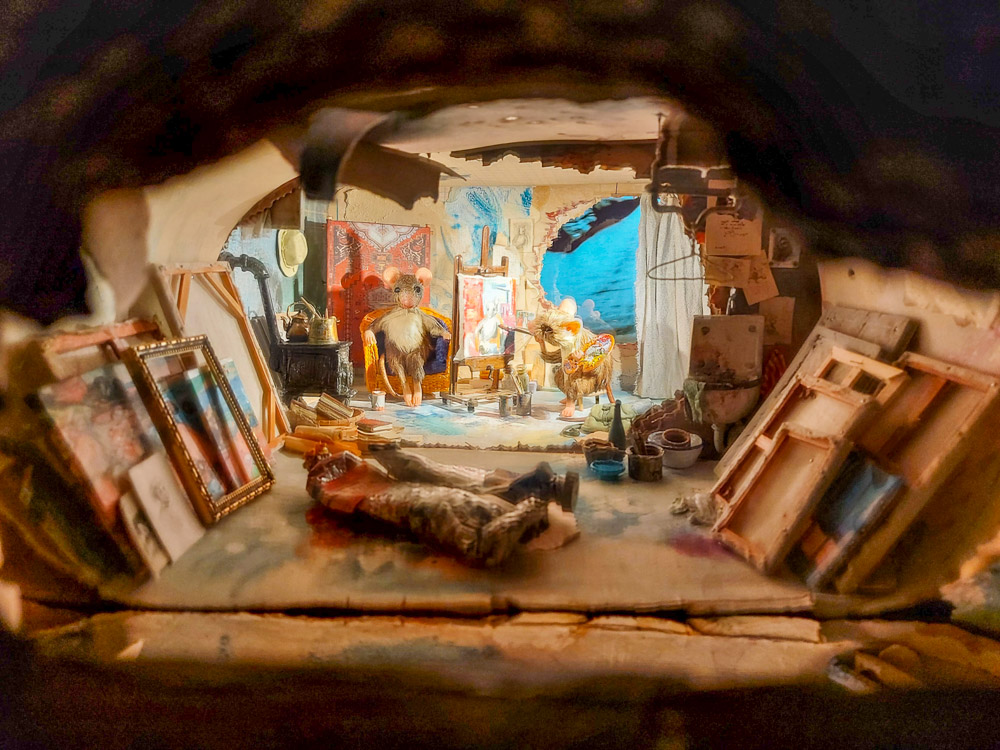
Don’t miss the hidden details in the exhibit on Munch’s home! Whilst you walk through the floor plan of his house and study the projections, look out for hidden holes in the furniture. In these you might just be able to spot another world of mice artists! The tiny scenes are adorable and well worth keeping an eye out for!
The Munch Museum is open from 10:00-18:00 on Monday and Tuesday and opens until 21:00 Wednesday to Sunday. The museum costs 160 NOK without the Oslo Pass.
7. The National Museum
Norway’s National Museum had only just opened the week before we were there. I expected it to be all about Norway but it was a mix of all sorts of artifacts from cultures across the world. The museum was absolutely huge and the ground floor was a bit of a maze so make sure you pick up a map to make sure you don’t miss anything! There was a mixture of history, art, design, technology and fashion, with each room housing an entirely different display. It was very eclectic!
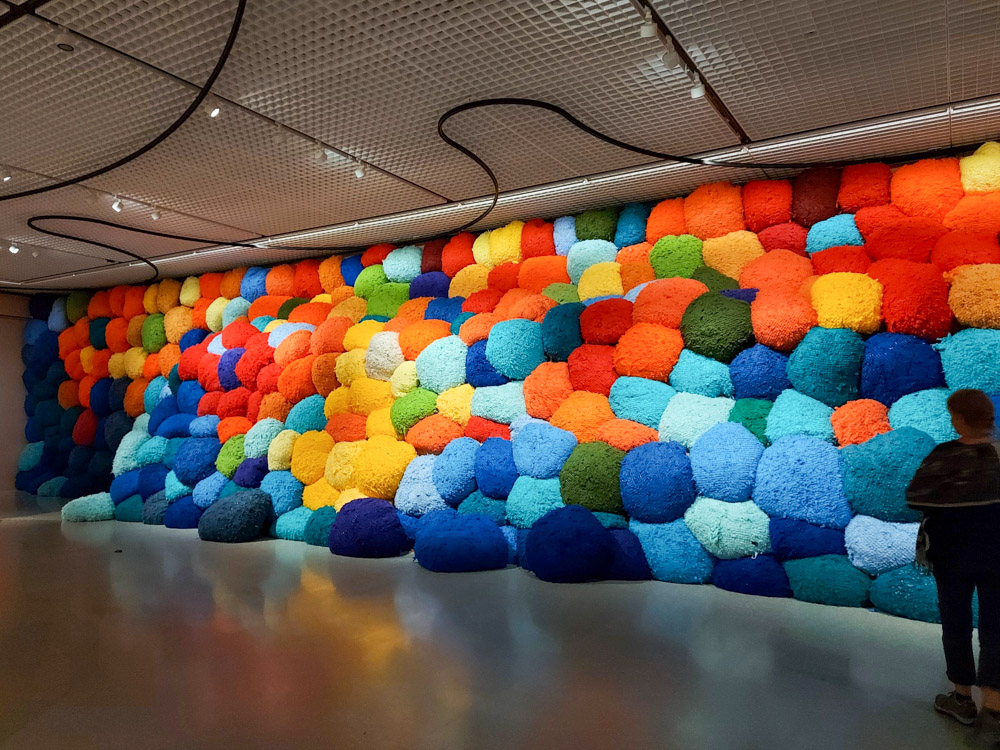
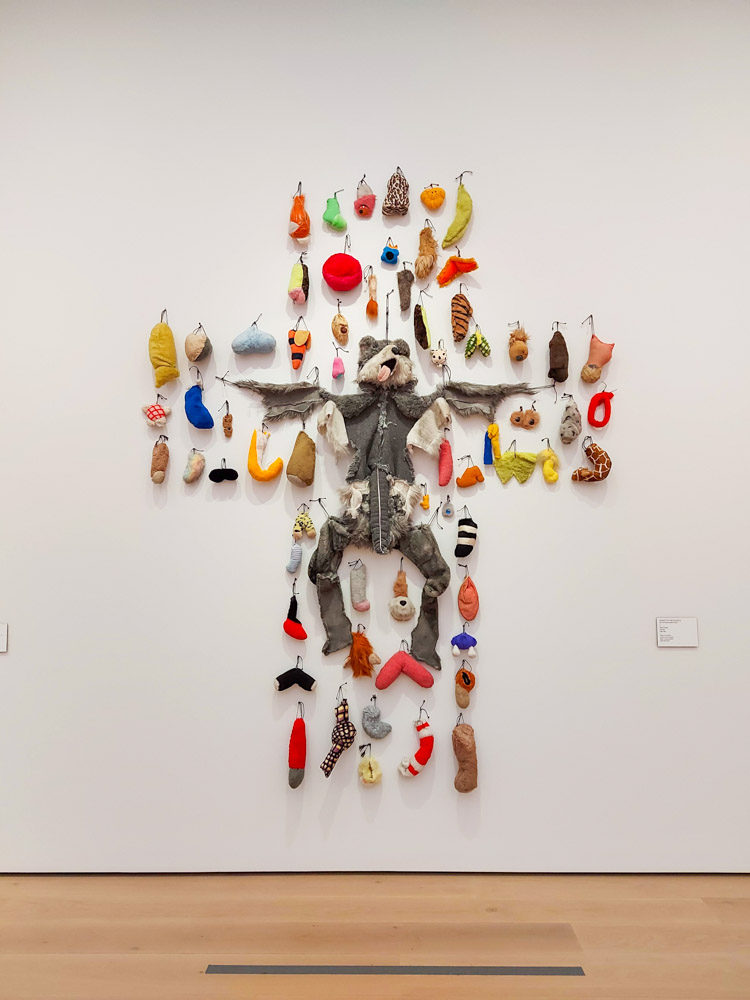
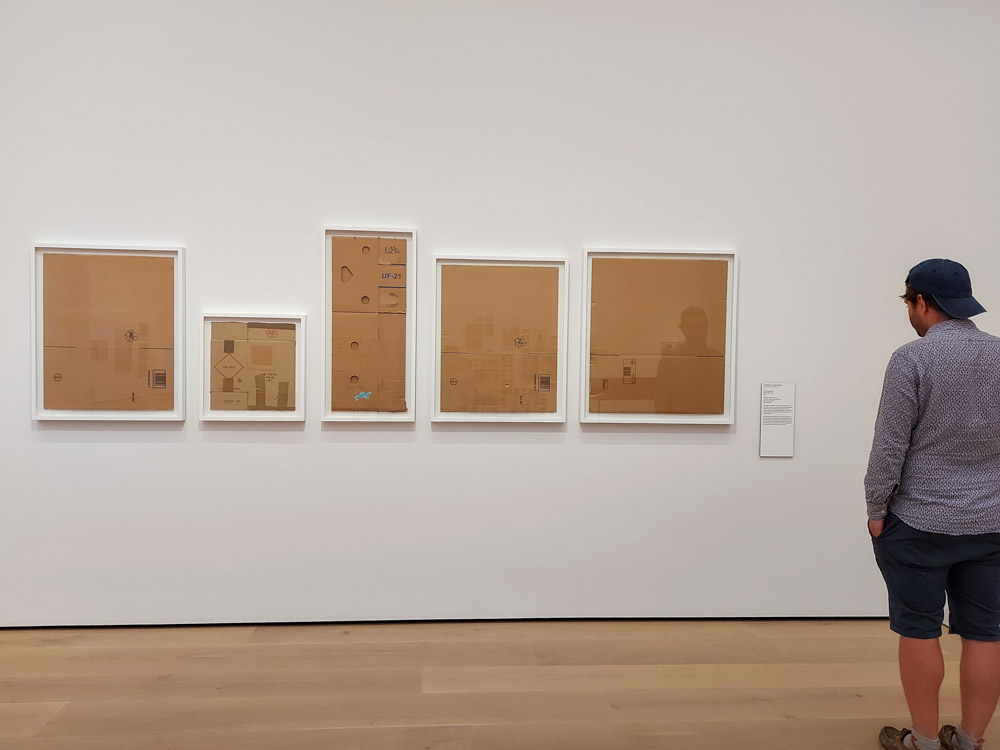
Upstairs, there is mostly modern art. This included giant colourful pom-poms filling a whole wall and framed cardboard boxes. There was also an interactive piece which was simply a set of metal stairs leading up to a tiny room with a heat lamp. It was all a little lost on me but interesting to see nonetheless. There is also a copy of Edvard Munch’s The Scream painting in the National Museum too. There are four copies in the world. So if you don’t get a chance to visit the Munch, you still have a chance to see the painting in the National Museum.
The National Museum is closed on Mondays but otherwise open 10:00-21:00. It costs 180 NOK for entry without the Oslo Pass.
8. More Museums
There are lots more museums and attractions included on the pass. Click here to view them all. If we had more time, here are a few others that we would have considered visiting:
- Norwegian Museum of Science and Technology – this was recommended to us by a friend and I do love science but it was just a little further out of the city. As we were trying to fit in as many as we could in one day, it didn’t make sense to spend so long traveling back and forth for one museum.
- Natural History Museum – we couldn’t squeeze it in on this trip but we did visit the Botanical Gardens which surround the museum and are free on our last day.
- Norway Resistance Museum – this museum focuses on Norway during World War II. It is within Akershus Fortress so it would make sense to pair it with a visit to Akershus Castle if you have the time.
- Viking Museum – unfortunately the Viking Museum was closed for renovations during our visit so we missed out. It should be open again in 2025.
How to Make the Most of the Oslo Pass
With just a 24 hour pass, you can still pack plenty into the day, especially as some museums are open late until 9pm. To make the most of your 24 hours, figure out first which museums and attractions you would like to visit. Plan a route checking which are near each other so you’re not jumping all over the city. Try to go to the furthest point first so you get the longest journey out the way before the museums open and leave the places that are open later until last.
Here is our itinerary for a 24 hour Oslo Pass:
24 Hour Oslo Pass Itinerary
09:00 – 10:00 – Take the bus (included with the Oslo Pass) to the Folk Museum, aim to arrive for 10am when the museum opens.
10:00 – 11:45 – Norsk Folkemuseum – you could easily spend all day here, there is so much to see! We managed to whip around just about everything in 1.5 hours because we wanted to squeeze in lots of other museums. The only thing we didn’t see was the indoor exhibitions.
11:45 – 12:00 – a quick 15 minute walk to Kon-Tiki, Fram and Maritime Museums which are all next door to one another. There is a small supermarket en route if you need a snack!
12:00 – 12:45 – Kon-Tiki Museum – this took us around 45 minutes to go around all of it, including both boat exhibitions and a short film.
12:45 – 13:45 – Fram Museum – Straight next door to the Fram. We didn’t quite see everything in the Fram within the hour but we managed to cover the main exhibit and the ice cave experience. We started a little bit of the next section but I felt like I had had enough of polar exploration by that point.
13:45 – 14:00 – Take the ferry (included on the Oslo Pass) from the harbour outside of the museums over to Aker Brygge. This will take you to straight outside the Nobel Peace Center.
14:00 – 14:15 – Lunch – Have a quick and relatively cheap bite to eat at the food vans outside the Nobel Peace Center. When we visited there were vans offering Greek and Asian Food.
14:15 – 15:00 – Nobel Peace Center – explore the exhibits in the Nobel Peace Center. We spent around 45 minutes here but you could easily spend far more or less depending on how long you spend on the interactive displays.
15:00 – 15:10 – Walk over to Akershus Fortress, this should take around 10 minutes.
15:10 – 15:40 – Akershus Castle – The castle closes at 4pm so if you’re running late you might not have time for this one but you can whiz round it all in 20-30 minutes.
15:40 – 16:00 – Walk to the Munch Museum, this should take around 20 minutes. You could get the bus instead if you’re feeling tired at this point (remember it is included in your pass) but it doesn’t save much time over this distance.
16:00 – 17:00 – Munch Museum – explore the many floors of the Munch Museum and take in the views of Oslo from the bar on the top floor!
17:00 – 19:30 – Dinner – take a break, have a sit down and enjoy some food! Dont’ forget to check the Oslo Pass app to see which restaurants offer discounts with the 24hour pass.
19:30 – 21:00 – National Museum – explore the many many rooms of the National Museum. This place is open until 9pm so you should have plenty of time to explore after dinner!
Is the Oslo Pass worth it?
If you can pack in as many museums and activities as we did, it is definitely worth it! For a 24 hour pass you would need to visit 3 – 5 museums in a day to make it worthwhile. We managed to squeeze in 7! Here is the breakdown of our costs and savings:
| Attraction | Price (NOK) | Price (GBP) | Price (EUR) | Price (USD) |
| Norsk Folkmuseum | 180 | £14 | €16 | $19 |
| Kon-Tiki Museum | 140 | £11 | €12 | $15 |
| Fram Museum | 140 | £11 | €12 | $15 |
| Nobel Peace Center | 140 | £11 | €12 | $15 |
| Akershus Castle | 100 | £8 | €9 | $10 |
| Munch Museum | 160 | £12 | €14 | $17 |
| National Museum | 180 | £14 | €16 | $19 |
| Total without Oslo Pass | 1,040 | £81 | €92 | $109 |
So by buying the 24 hour Oslo pass for 445 NOK, we saved a 595 NOK (£46) – and that’s before even factoring in the cost saved on public transport as well. To be fair, if we didn’t have the pass, we probably wouldn’t have visited all of these museums in one day but we definitely got our money’s worth! Even if bought the 48 hour or 72 hour pass and spread out the same activities over a few days, we still would have saved money over buying individual tickets.
More Oslo Travel Tips
Oslo, Norway is a great city to visit for a long weekend. There is lot to squeeze into 48 hours so here is the perfect itinerary to see all the top…
Oslo is definitely an expensive city to visit. But that doesn’t mean you can’t visit on a low budget. We recently visited Norway’s capital for a long weekend and as usual,…

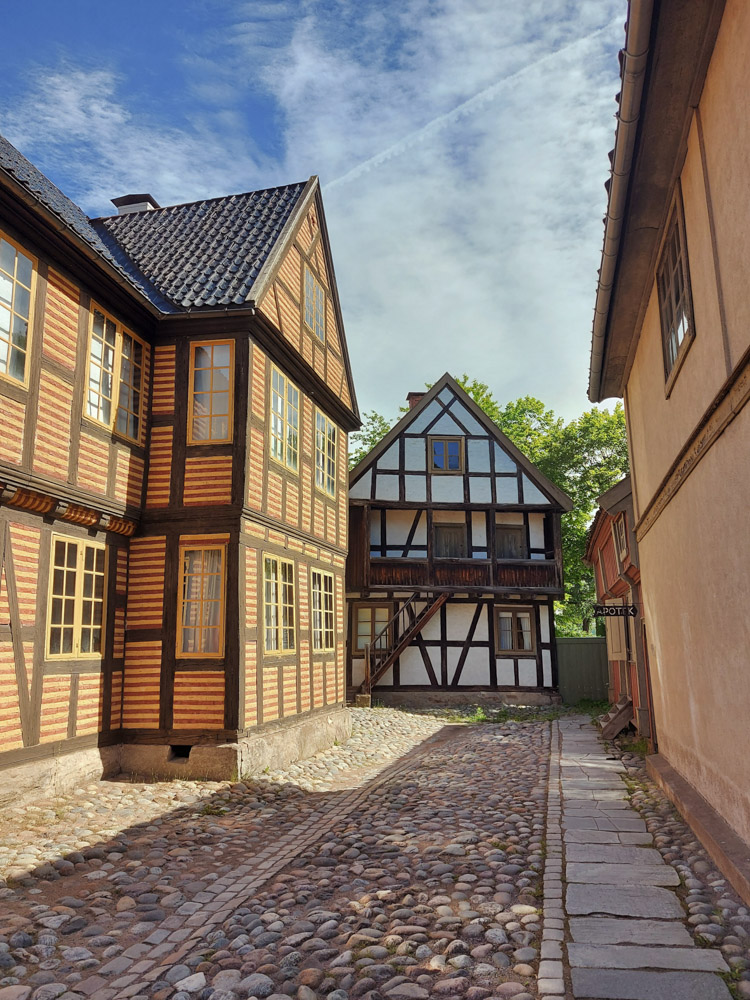
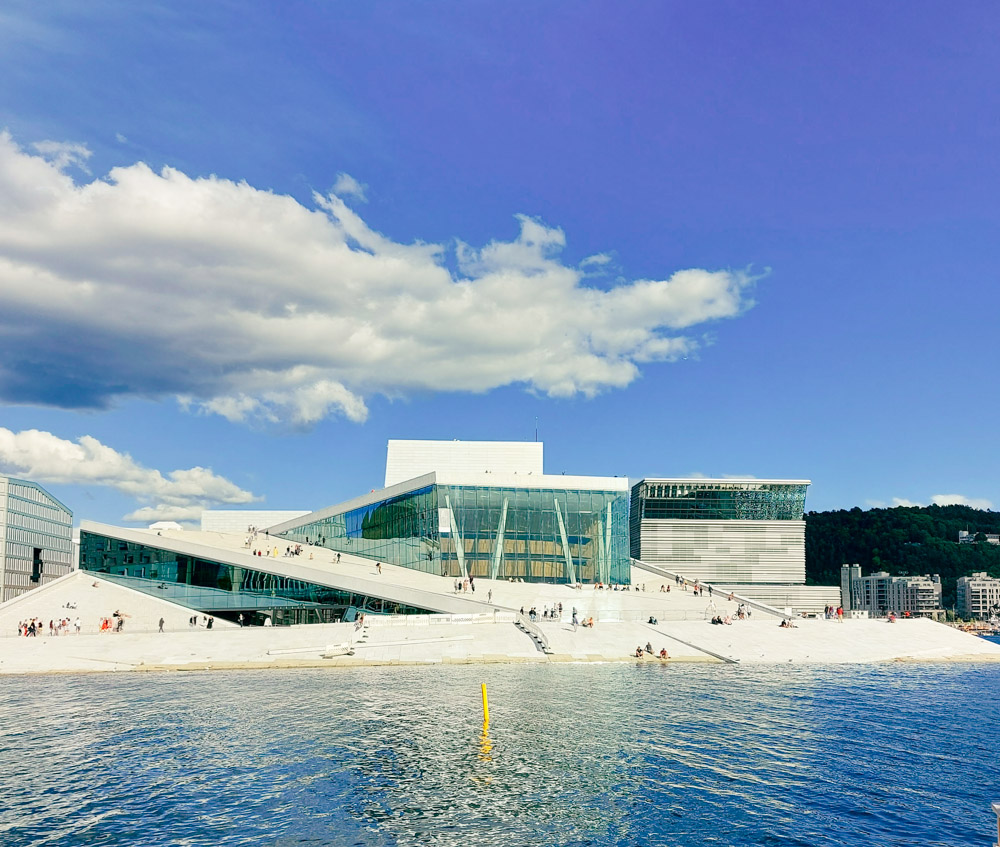
2 thoughts on “Is the Oslo Pass worth it?”